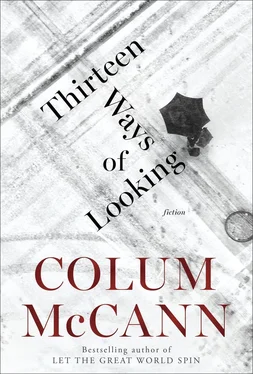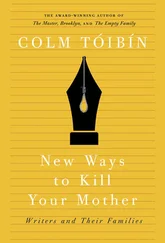— I lost the address. My brother. It was written down. It’s…a cog in my head. It just comes and goes.
— Sorry, love, he says, can’t help you there.
She watches as the driver opens his car door for another customer. A vine. Dark green. A line through the trees. The sound of a radio. A small steel lock on the door. Escape. It was easy enough to cut through the bamboo: once with a sharpened coat hanger, once with a piece of corrugated metal. She squeezed herself through the gap, crept along in her rubber-soled shoes. She got as far as the river, but it was so swollen with rain that it terrified her: she simply sank to her knees and waited, slumped against the trunk of a tree. They found her, covered head to toe in ant bites. When she recovered, she was beaten. He pulled a hood over her head. Darkness folded around her. The cloth smelled of rotting fruit. She vomited and he left her in the hood a few minutes, to stew. Afterward she mumbled her prayers. Rosary after rosary. Her body ached. She bled. It seeped through to her dress. Carlos allowed her to wash. The appalling embarrassment. Always turning away, hunched over, covering her breasts, her groin, bent into whatever shadow she might find. Someone watching from afar. She wondered what might happen if she ever conceived a child. One time, the clock of her body stopped for two months. It terrified her, then she bled again. She was not forsaken. She cleaned herself. Immerse yourself in prayer wherever you happen to be.
Beverly shuffles out from the taxi line and back under the awning of the railway station. The ambush of the mind. She has grown unreliable even to herself. These turnings, these slippages. The distant piano still sounds out. Perhaps that’s the piped music of the station? What was the name of Ian’s street? How did I get here? I had his address when I was at the airport. On the train. On the tube. Maybe it fluttered to the floor.
She wishes a moment to be back again with the girls in Houston. To conjure a safe place out of nothing. To return to the known, the benign, the easy. To stand with them at the back entrance. Sister Stretch. Perching on the back steps, smoking. Kneeling in the small basement chapel alongside her Sisters. Or even the simplicity of the convent house on Long Island. To walk along the beach and watch the gulls drawn through the dawn. Sister Anne. Sister Camille. The other Sister, the Argentinian, she cannot recall her name, what was it?
At the traffic light on Vauxhall Bridge Road, she pauses. It catches then, and she remembers: John Islip Street.
—
HE HAS GAINED A small paunch and his eyes are puffy as if sleep has eluded him for a while now, but he is still tall and elegant and silver-haired, the sort of man who insists on a tie even while alone in the late afternoon.
— Bev, he says.
Her childhood name. It reminds her of the stone bridge over the river in Oughterard, the water running quick and shallow and light-veined beneath her.
— What in the world are you doing here?
He reaches immediately for her suitcase. She stands a moment on the precipice of the apartment. The river ran swiftly west. Copper-colored in summertime. Fly-fishermen stood at the bend where the oak trees bowed. A low plain of red sky cupped over them.
He takes her arm and guides her toward the living room. An ancient coat of books on the walls: novels, photography collections, advance reading copies, poetry. Stacks of them piled every which way on the floor.
He sweeps five or six books from the lumpy brown couch. They skitter across the carpet to meet their fellows.
— Collision, she says.
Ian takes her hand. His fingers feel cold to the touch. What is it that he fills his days with now? What gives him pause? What, apart from books, jostles his mind? Even from a young age he never really believed in God, or ideas of poverty, purity, piety. There were times, in recent years, on the phone, that he railed against the Catholic Church. The abuse. The scandals. The Magdalene Laundries. The deceitful morass of bureaucracy. The lives bought, he said, on the condition of the buyer’s ignorance. She knew the flaws, the awful shame, the flagrant greed. She had no need to defend it, to protest. She, too, had doubted the Church — more deeply, perhaps, than her brother could ever have known. Not so much in the jungle, but afterward, in the crisp sheets of the Saint Louis hospital, where she admitted the terror, as if it had been set on delay. What was it that she herself had desired? What mirror had He thrust at her? There were days that the blame hit her with such force she could hardly stand. She told herself it was her fault: her body, her mind, her failure. She had enticed him. Asked for it. Deserved it. The days withheld their light. Her mind was an empty seed. The despair swelled in the husk of dark.
— Are you okay? What happened? Bev? You said collision.
— I did?
— I’ll make tea. I’ll get you a cup of tea.
— I’d like that, yes.
The rattle of teacups. He pokes his head around the corner.
— I’ll be right there, he says, don’t fall asleep.
She hears, then, the high whistle of the kettle and the soft sigh of the fridge door.
On one bookshelf stands a photograph of their parents sitting on the front bumper of an ancient motorcar, the large white headlights, the curved panels, the air horn. An impossible era. They stand remote from her, more photograph than memory. Somewhere, deep in the apartment, she hears a voice, and then a burst of classical music. A radio piano.
Ian enters the room and carefully places the tray down on the table. Two china cups, a plate of biscuits, a teapot in a cozy. He is still a man of the ancient ways. He was married once, long ago, to a woman from Scotland, but they never had children. A woman of short hair and spectacles. A psycholinguist. They divorced. Ian had been afraid to tell Beverly at first. What was her name again? These words escaping, like slow punctured air from her lungs.
He pours the tea through a small metal strainer and holds the jug of milk up as if to measure not just her preference, but her demeanor.
— I think I might be forgetting things, Ian.
— Oh, God, no.
— It’s not Alzheimer’s, not that.
She pauses with the teacup at her mouth: Or, rather, not forgetting. I’m not sure what to say. It’s a sort of remembering, I suppose.
— Whatever do you mean?
— He came back, you know.
— Who came back, Bev?
A curtain opens up on her brother’s face, then, when she tells him: the exhaustion in Houston, the move to Long Island, the appearance on the television, the confusion, the doubt, the night on the stairs with Sister Anne, the constant return of Carlos’s face as she walked along the beach, how he was a man of peace now, it rattled her, she could not shake it, she had to come see him, she had to see if perhaps it was true, is it possible to find peace when all along you have sought to destroy it, how is it that a man can change so entirely, where did the shift within him occur, what was the word she was looking for, reconciliation ?
— And now he’s at some peace conference?
— An institute, yes.
— And you want to see him?
— I don’t even know for sure if it’s him.
The quick flit of Ian’s eyes: green, same as her own. A brother, then. Perhaps that is it? Perhaps Carlos had a brother? A cousin? She has never even entertained the notion. A twin even. The panic claws her throat. What if it’s the simplest error of all and there is someone identical? An exact duplicate who is, in fact, the opposite?
Ian picks a biscuit from the plate, bites down softly, and lets it dissolve on his tongue.
— What day is it today?
— Sunday of course.
Читать дальше












